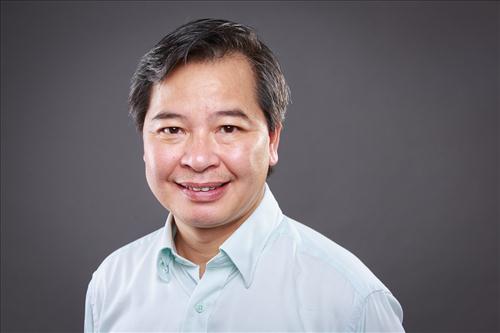
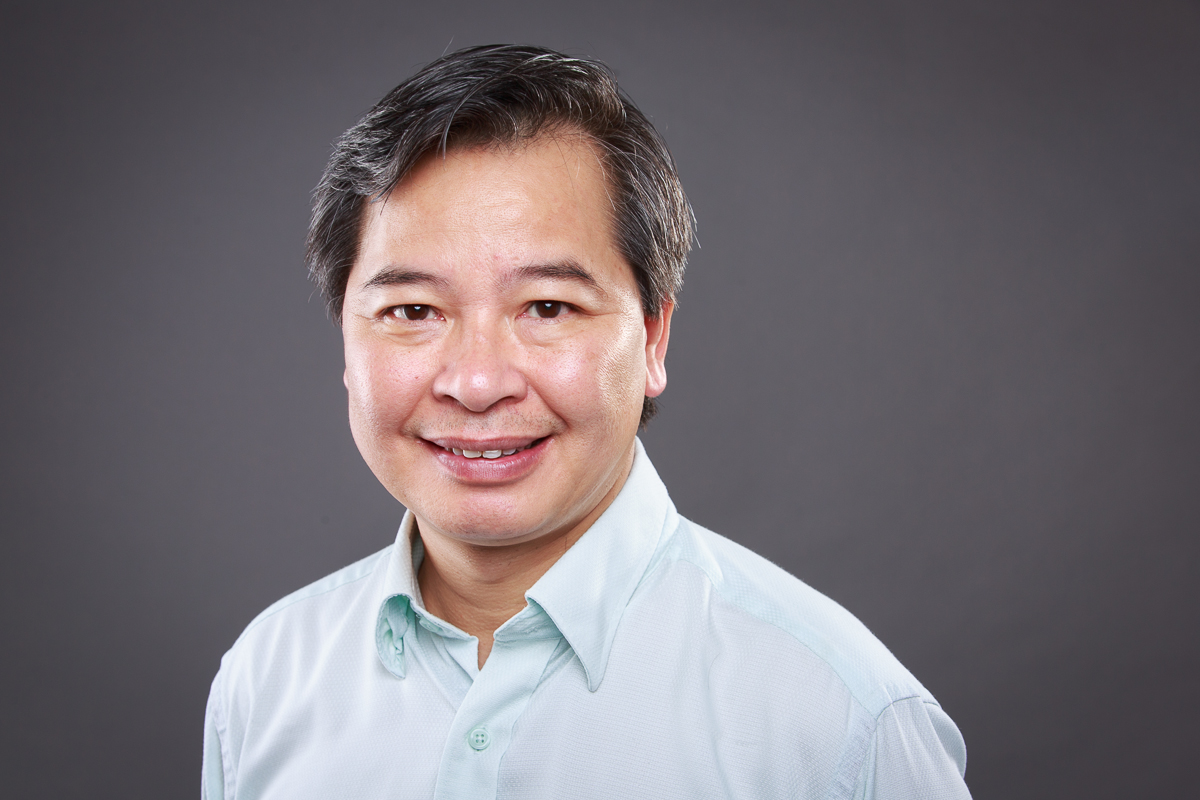
Prof. Dr. Pham Quang Minh - Rector of the University of Social Sciences and Humanities, Vietnam National University, Hanoi
- Looking back at 2016, Professor, what do you consider to be the most noteworthy achievement of the Faculty of Social Sciences and Humanities?
I believe the most important achievement of the School is the smooth and successful transition of the new leadership and organizational restructuring. The new organizational structure ensures stability, continuity, and has initially yielded positive results. The new Board of Directors and the management of functional departments and affiliated units have shown high levels of consensus and agreement in implementing the School's new plans and tasks. Importantly, this change has not caused internal disruption or conflict, and has fostered the collective strength and unity of the entire team towards the School's greater goals in the future. I consider this the most important achievement and a foundation for future reforms.
Other organizational changes include: merging the Training Department and the Postgraduate Training Department into a single Training Department, thereby unifying the management of the university's training activities; renaming the Department of External Relations and International Training Cooperation to the Department of Cooperation and Development to expand its functions and responsibilities in line with new trends. Last year, the university also established the Department of Religious Studies, separated from the Faculty of Philosophy, increasing the number of training units to 16 faculties and one department.
The school is also increasingly focusing on communication, building a new image with the new slogan "Honoring the Past, Embracing the Future." Through this, the school's leadership wants to convey a message about the values and rich traditions of the school to the staff and students, thereby enhancing pride, cohesion, responsibility, and confidence in the future.
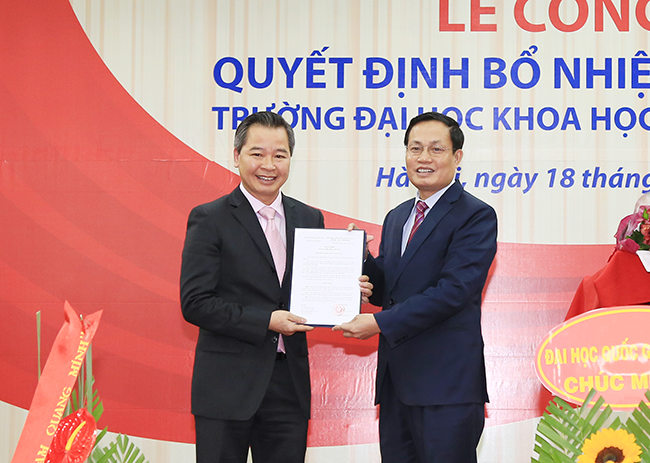
Professor Nguyen Huu Duc, Vice Director of Hanoi National University, presented the appointment decision for the Rector position to Professor Pham Quang Minh.
- We understand that international scientific publications have been a focus of the university in recent years. Professor, could you share more about this?
International scientific publications are an indicator of the university's regional integration and internationalization, as well as a measure of the capacity of its scientific staff. Over the years, the university has implemented many policies to encourage and motivate international publications by its staff. While in 2010, the reward for an international article published in general scientific journals was 5 million VND, this year, the reward for an article in high-impact journals (ISI/SCOPUS) has reached 15 million VND. Similarly, while in 2010 the total number of international publications from the university was only 7, by 2016 this number had risen to 50, including 6 articles listed in the ISI and Scopus databases.
However, the greatest achievement is that the University has contributed to changing societal perceptions and views on international publications in the social sciences and humanities. Previously, many believed that integration in the social sciences and humanities was more difficult than in other scientific fields. However, looking at the increase in both the quantity and quality of the University's publications, it's clear that this is entirely possible. The key is having good policies and mechanisms, and appropriately recognizing and honoring the contributions of scientists, thereby encouraging their creativity. For researchers, recognition is more important than money. What they need is an academically free environment and the acknowledgment of their research results. International publication is gradually becoming a habit and a new cultural aspect of the University's academic activities.
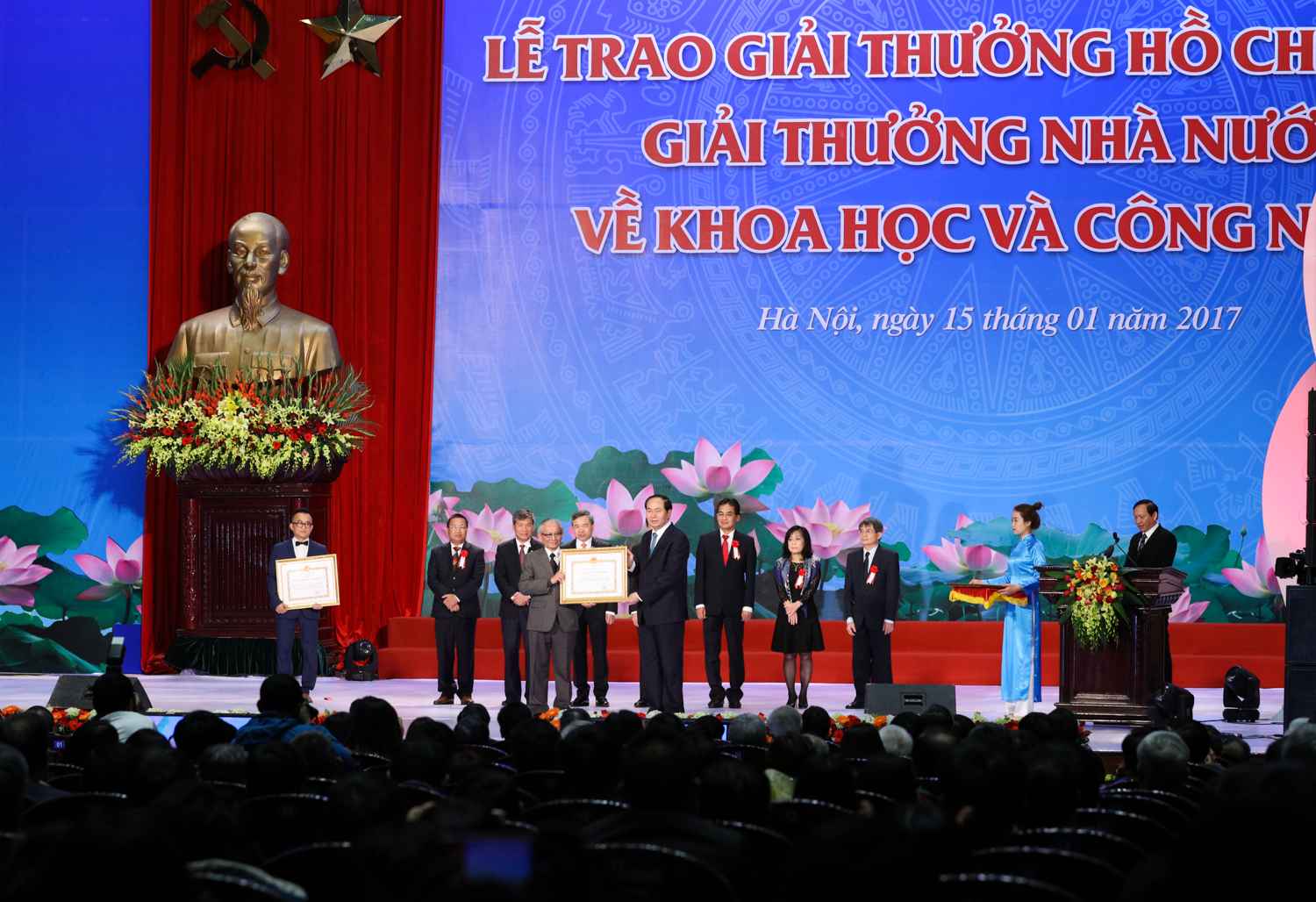
Professor Phan Huy Le was awarded the Ho Chi Minh Prize for Science and Technology in 2016.
Furthermore, after only one year of operation, the University's Journal of Social Sciences and Humanities was ranked among the prestigious scientific journals by the State Council for Professor Titles, with each article worth 1 point. Currently, the University's Journal of Social Sciences and Humanities publishes 6 issues annually, including 2 in English. The journal's editorial board consists of reputable scientists both domestically and internationally. The peer review process for scientific articles is quite rigorous, with independent review by two reputable scientists. The journal's goal is to be included in the Scopus database of scientific journals by 2020.
The university has also registered to participate in the ASEAN Science Citation Index. In the future, scientific publications by the university's staff will have more opportunities to appear in the region's citation index. These are commendable efforts by the university towards internationalization and integration in the field of scientific research.
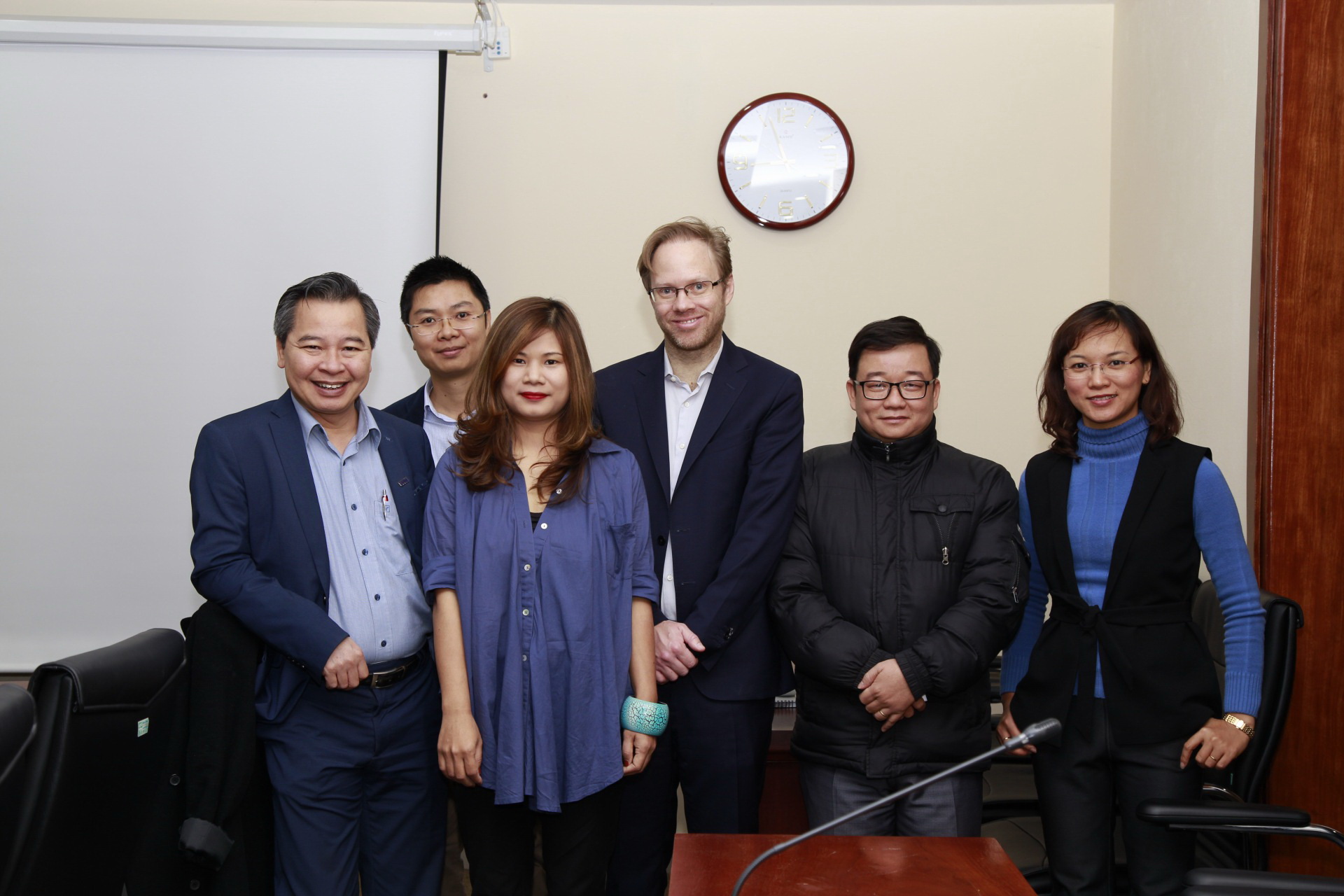
Professor Pham Quang Minh and domestic and international delegates at a seminar on journalism and media within the framework of the research program on the Internet and social networks of the University of Social Sciences and Humanities.
- It's clear that innovation and integration are key keywords in the school's development goals. So, how is this reflected in other areas of the school, Professor?
The mark of innovation and integration is also reflected in many other achievements of the University over the past year. Regarding training, the University has reviewed and adjusted the training process at all levels, aiming to shorten the training time to ensure efficiency and scientific rigor, avoiding situations where students have to prolong their studies due to technical factors. With a student-centered philosophy, the management and support of training have also been required to change towards a more proactive and responsible approach. Another highlight is that this year, more than 20 lecturers have registered to teach their courses in English. This is also a trend encouraged by the University, thereby improving the foreign language proficiency of both lecturers and students, and ultimately attracting more international students. Over the past year, the University also conducted quality accreditation according to AUN standards for the Philosophy program, following the successful accreditation of the Linguistics and Oriental Studies programs. It is expected that by 2020, eight undergraduate programs will be accredited according to AUN standards.
This year also saw a strong development in international cooperation, evidenced by the signing of over 250 cooperation agreements. Among the partners who signed cooperation agreements with the University are the University of Zurich (Switzerland), Rikkyo University, Kobe University (Japan), Cologne University (Germany), Beijing Foreign Studies University (China), etc. Last December, the University supported the establishment of the Vietnam Research Center at Beijing Foreign Studies University.
Many international cooperation projects have been implemented effectively, in depth, and yielding tangible results, such as the “Enhancing National Innovation and Research Capacity in Vietnam” (ENHANCE) project, funded by the European Union's Erasmus+ program. This project involves six Vietnamese universities and three European universities. It comprises seven specific activity packages with a range of research activities, assessing the current state of research and innovation in Vietnam, and proposing solutions to support Vietnamese universities in enhancing their innovation, research, and technology transfer capabilities. Another example is the “Southeast Asia Internal Quality Assurance Training Project,” involving numerous partners such as DAAD, AQAN, AUN, ENQA, HRK, SEA, etc.; and finally, the “ASEAN Research Project,” funded by the EU for three ASEAN universities and seven EU universities. In addition, other projects funded by traditional partners such as the Konrad Adenauer Institute and the Rosa Luxemburg Institute have maintained good operational efficiency.
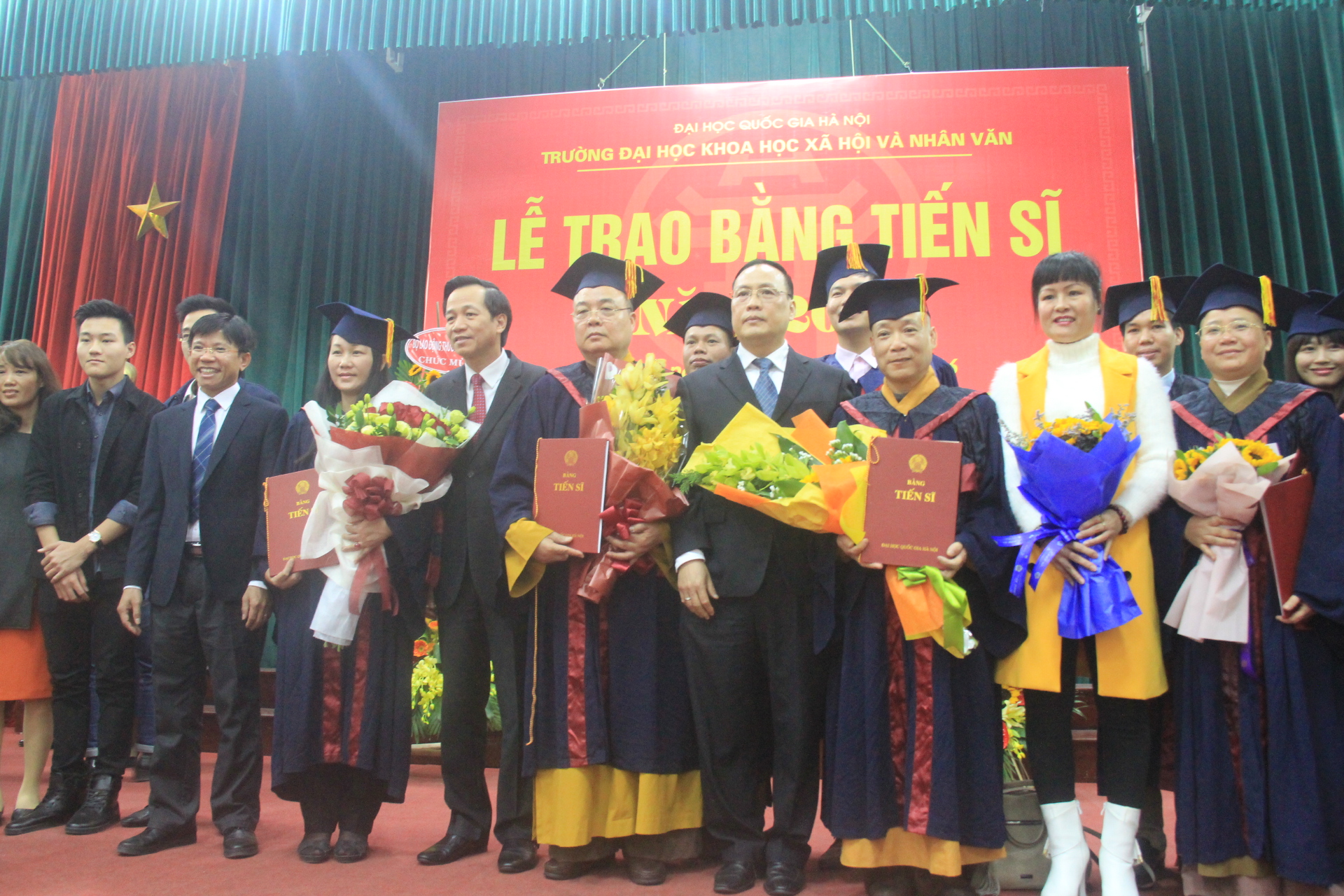
Doctoral degree awarding ceremony 2016 at the University of Social Sciences and Humanities
So, Professor, what are the challenges for the coming year?
The challenges are numerous, but perhaps the most important is the ongoing and far-reaching Fourth Industrial Revolution, which is having a profound impact globally. This revolution forces us to change significantly, from upgrading infrastructure to transforming university governance, innovating teaching methods, research, and international cooperation.
Next, there are challenges regarding the quality of scientific research projects and the capacity of the staff. Although the university has a large number of scientific research projects and a relatively high number of qualified scientific staff with PhDs, Professors, and Associate Professors (11 Professors, 95 Associate Professors, and 121 PhDs), the number of reputable scientific publications in general, and international publications in particular, is not commensurate with the number of projects and the potential of this staff. The number of staff with international publications is limited to only 25-30 people, meaning only about 25% of highly qualified staff are capable of publishing internationally. Among many reasons, foreign language proficiency remains one of the most difficult barriers to overcome in the short term. The university hopes that each Associate Professor/Professor will publish at least one international paper per year.
The third challenge lies in university governance: how to foster creativity, initiative, and responsibility in the work of each individual. University governance needs to be implemented in a way that is rational, scientific, transparent, links rights with responsibilities, and applies advanced science and technology to create high labor productivity among the staff.
The final challenge worth mentioning is how to promote communication activities and build the school's image, thereby developing resources, building cooperation programs with local communities and businesses, and creating strong connections and high levels of interaction between the school and society.
- So, Professor, could you share your hopes for the coming year?
The spirit of openness, innovation, and creativity will continue to be the fundamental values that the University will pursue in its future development. We cannot sit and wait; we must be proactive and change ourselves. There is no other way; from leaders and staff to students, the University must strive for continuous innovation to ensure its sustainable development.
On behalf of the Party Committee and the Board of Directors of the University, I would like to express my sincere gratitude for the support and assistance from Hanoi National University, and the dedicated contributions of the faculty, students, postgraduate students, and doctoral candidates, which have made the past year a success for the University of Social Sciences and Humanities. I hope that in the coming year, the efforts and hard work of the faculty and staff will bring about even more comprehensive and profound changes in all areas of the University's activities.
On the occasion of the Lunar New Year of the Rooster, I would like to extend my best wishes to all the teachers, colleagues, friends, and students of the University in particular, and Vietnam National University, Hanoi in general: good health, happiness, and success.
Author:Thanh Ha
Newer news
Older news